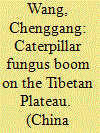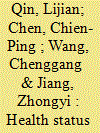| Srl | Item |
| 1 |
ID:
161768


|
|
|
|
|
| Summary/Abstract |
In the last two decades, the Tibetan regions of China have been experiencing a remarkable economic boom fueled by the caterpillar fungus, known in the West as the “Viagra of the Himalayas” or “Tibetan Gold.” This article examines the impacts of the caterpillar fungus boom on Tibetan pastoralists' current-day livelihood and the prospects of their future economic development. Our study is based on a household survey conducted in 2016 covering 58 villages across the Tibetan autonomous land area. Results show that the new stream of cash income from gathering and trading caterpillar fungus has had a strong short-term welfare-improving effect. Household consumption, healthcare spending, and religious charity have risen sharply with caterpillar fungus income. Unfortunately, the fungus boom has not brought about productive investment or human capital accumulation that is conducive to long-term growth. Rather, the resource windfall has created disincentives for school attendance, nonfarm labor participation, and productivity improvements in pastoralism. The resource boom-induced disinvestments, if persistent, will likely further limit the capabilities of rural Tibetans to compete in the urban labor market, reinforcing the emerging trend of socioeconomic marginalization. We contextualize these findings in terms of Tibetans' cultural and economic rationale, pointing out new directions for future research and policymaking.
|
|
|
|
|
|
|
|
|
|
|
|
|
|
|
|
| 2 |
ID:
138107


|
|
|
|
|
| Summary/Abstract |
The migration of rural laborers into cities for employment has been one of the main driving forces of China's economic growth over the past three decades. Based on a dataset collected by the Ministry of Agriculture of China from 2003 to 2007, this paper examines the impact of health on the earnings of migrant workers engaging in physically-intensive work requiring good health. Our findings indicate that a poor health status not only weakens the incentive of rural laborers to participate in the migrant labor force but also significantly reduces their earnings. A migrant worker in poor health only earns 67 percent of what a healthy worker makes. Among all the human capital characteristics and family economic factors, health status is the most influential on earnings for less educated workers. Labor productivity has a greater impact on earnings than the annual number of days that a person works. Ongoing health-care reforms aimed at the improvement of the health-care services available to rural laborers are urged to help reduce poverty in rural China.
|
|
|
|
|
|
|
|
|
|
|
|
|
|
|
|